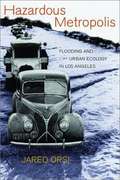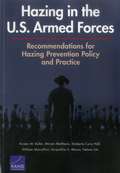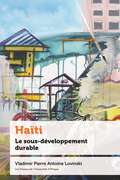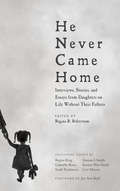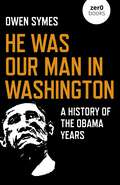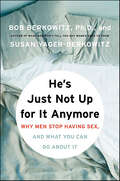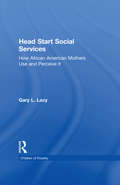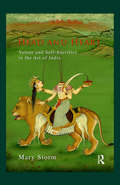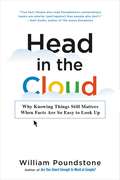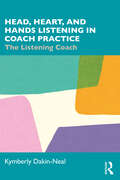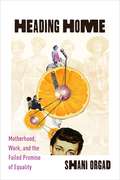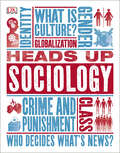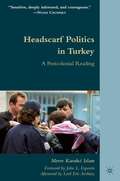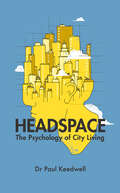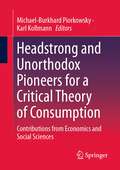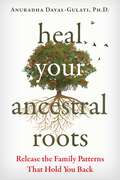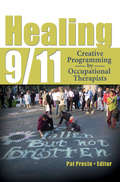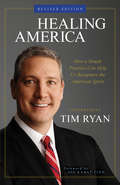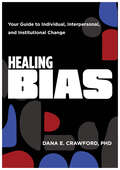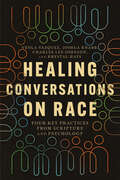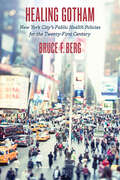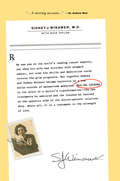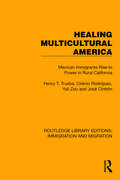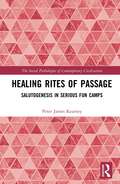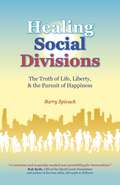- Table View
- List View
Hazardous Metropolis: Flooding and Urban Ecology in Los Angeles
by Jared OrsiAn fascinating history of flood control efforts in Los Angeles from the 1870s to the present, showing how engineering has continually failed to contain nature. This book teaches us to think of cities as ecosystems.
Hazing in the U.S. Armed Forces
by Nelson Lim Kimberly Curry Hall Kirsten M. Keller Jacqueline A. Mauro Miriam Matthews William MarcellinoThis report documents research focused on helping the Department of Defense build a more-systematic approach to hazing prevention and response. The report documents theory and research on the root causes of hazing and findings and recommendations regarding how best to define hazing, practices to prevent and respond to incidents of hazing, and how the armed forces can improve the tracking of hazing incidents.
Haïti: Le sous-développement durable (Politique et politiques publiques)
by M Vladimir Pierre LovinskiAre the priorities of sustainable strategies aligned with the local realities and needs of Haitian society? Are local actors involved in the economic development process? What role does the local community play in collective decision making? Do the ruling class and policy makers have the will to make local development and decentralization an effective reality in Haiti? The foundations of these concepts assume that community, actors, citizens, and authorities should be included in the decision-making process. Aimed to leading to the development of sustainable policies, however, local development planning is difficult to institutionalize. Lovinski’s analysis is based on a multifaceted interpretation of development and takes an institutional approach to public policy. Thereby, prompting an interrogation of sustainable policies prioritized by policy makers. This investigation examines the steps taken to achieve sustainable policies and shows the results and considering the dynamics and their ambiguities.
He Never Came Home: Interviews, Stories, and Essays from Daughters on Life Without Their Fathers
by Sarah Tomlinson Gabrielle Reece Regina King Simone I. Smith Kirsten West Savali Cori Murray&“The strong, authentic voices of the women sharing their own narratives and awakenings from life without fathers is the power of this book.&” —Esme AAMBC Non-Fiction Self-Help Book of the YearAAMBC Breakout Author of the Year He Never Came Home is a collection of twenty-two personal essays written by girls and women who have been separated from their fathers by way of divorce, abandonment, or death. The contributors to this collection come from a wide range of different backgrounds in terms of race, socioeconomic status, religion, and geographic location. Their essays offer deep insights into the emotions related to losing one&’s father, including sadness, indifference, anger, acceptance—and everything in between. This book, edited by Essence magazine&’s west coast editor Regina R. Robertson, is first and foremost an offering to young girls and women who have endured the loss of their fathers. But it also speaks to mothers who are raising girls without a father present, offering important perspective into their daughter&’s feelings and struggles. The essays in He Never Came Home are organized into three categories: &“Divorce,&” &“Distant,&” and &“Deceased.&” With essays by contributors including Emmy Award-winning actress Regina King, fitness expert and New York Times bestselling author Gabrielle Reece, television comedy writer Jenny Lee—and a foreword by TV news anchor Joy-Ann Reid—this anthology illustrates the journey of the fatherless, and provides a space for these writers to express their pain, hope, and healing, minus any judgments and without apology.
He Was Our Man in Washington: A History of the Obama Years
by Owen Symes'Owen Symes is a rising young star who has created a masterful social history of the Obama years. The clarification of Obamacare and other policies for health and human services is especially helpful. As we move forward, Symes&’s analysis helps us shed our illusions so we can avoid making the same mistakes all over again.' Howard Waitzkin, Distinguished Professor Emeritus of Sociology, University of New MexicoHe Was Our Man in Washington provides a detailed narrative of the years of the Obama administration gravitating around six key topics: the War on Terror, the Great Recession, marginal struggles, the Affordable Care Act, climate change, and Indigenous issues, that sit at the intersection of the other topics. Each chapter begins with a brief account of the historical context within which the Obama administration acted. The result is a fair-minded but highly critical interpretation of president Obama and his brand of "hope and change," grounded in a reality that goes beyond mere headlines.
He's Just Not Up for It Anymore: Why Men Stop Having Sex, and What You Can Do About It
by Susan Yager-Berkowitz Bob BerkowitzAn estimated twenty million American men and women are in relationships in which the man has stopped being sexually intimate. Is the problem physical, emotional, or psychological—or are these guys simply bored with their partners?To find answers, bestselling author and relationship expert Dr. Bob Berkowitz and his wife, Susan Yager-Berkowitz, began an unprecedented survey of more than four thousand men and women in this situation, gathering data and following up with hundreds of interviews with selected respondents. Why Men Stop Having Sex provides a unique window into the sexless man's mind—so that men and women can understand this important issue and begin to address the problems that have inhibited intimacy, and ultimately solve them.
Head Start Social Services: How African American Mothers Use and Perceive Them (Children of Poverty)
by Gary LacyFirst published in 1999. Routledge is an imprint of Taylor & Francis, an informa company.
Head and Heart: Valour and Self-Sacrifice in the Art of India
by Mary StormAn extensive study of self-sacrificial images in Indian art, this book examines concepts such as head-offering, human sacrifice, blood, suicide, valour, self-immolation, and self-giving in the context of religion and politics to explore why these images were produced and how they became paradigms of heroism.
Head in the Cloud: Why Knowing Things Still Matters When Facts Are So Easy to Look Up
by William PoundstoneThe real-world value of knowledge in the mobile-device age.More people know who Khloe Kardashian is than who Rene Descartes was. Most can't find Delaware on a map, correctly spell the word occurrence, or name the largest ocean on the planet. But how important is it to fill our heads with facts? A few keystrokes can summon almost any information in seconds. Why should we bother learning facts at all?Bestselling author William Poundstone confronts that timely question in HEAD IN THE CLOUD. He shows that many areas of knowledge correlate with the quality of our lives--wealth, health, and happiness--and even with politics and behavior. Combining Big Data survey techniques with eye-opening anecdotes, Poundstone examines what Americans know (and don't know) on topics ranging from quantum physics to pop culture. HEAD IN THE CLOUD asks why we're okay with spelling errors on menus but not on resumes; why Fox News viewers don't know which party controls Congress; why people who know "trivia" make more money than those who don't; how individuals can navigate clickbait and media spin to stay informed about what really matters. Hilarious, humbling, and wildly entertaining, HEAD IN THE CLOUD is a must-read for anyone who doesn't know everything.
Head, Heart, and Hands Listening in Coach Practice: The Listening Coach
by Kymberly Dakin-NealThis book is an exploration of intentional listening as an essential skill for coaches. It introduces the Head, Heart, and Hands Listening model as a vital tool to amplify effective listening in coaching practice. Accessible and applicable, the book explores the three listening modalities of Head, Heart, and Hands as active, though largely unconscious, lenses that inform the potency of our listening. Dakin-Neal argues that once coaches identify "how" they listen, they can assist their clients in more targeted ways to positively impact their personal and professional lives. Chapters are divided into the three listening modalities, Head, Heart, and Hands, and are filled with case studies, stories, reflective questions, and exercises from the author’s experience to help coaches strengthen their listening skills. The book also includes a comprehensive listening assessment for coaches to use in practice. This book is essential reading for coaches in practice and in training as well as organizational psychologists, HR professionals, and those working within corporations.
Heading Home: Motherhood, Work, and the Failed Promise of Equality
by Shani OrgadWomen in today’s advanced capitalist societies are encouraged to “lean in.” The media and government champion women’s empowerment. In a cultural climate where women can seemingly have it all, why do so many successful professional women—lawyers, financial managers, teachers, engineers, and others—give up their careers after having children and become stay-at-home mothers? How do they feel about their decision and what do their stories tell us about contemporary society?Heading Home reveals the stark gap between the promise of gender equality and women’s experience of continued injustice. Shani Orgad draws on in-depth, personal, and profoundly ambivalent interviews with highly educated London women who left paid employment to take care of their children while their husbands continued to work in high-powered jobs. Despite identifying the structural forces that maintain gender inequality, these women still struggle to articulate their decisions outside the narrow cultural ideals that devalue motherhood and individualize success and failure. Orgad juxtaposes these stories with media and policy depictions of women, work, and family, detailing how—even as their experiences fly in the face of fantasies of work-life balance and marriage as an egalitarian partnership—these women continue to interpret and judge themselves according to the ideals that are failing them. Rather than calling for women to transform their feelings and behavior, Heading Home argues that we must unmute and amplify women’s desire, disappointment, and rage, and demand social infrastructure that will bring about long-overdue equality both at work and at home.
Heads Up Sociology (DK Heads UP)
by DKWhy does racism exist? Is Big Brother watching us? Why are women paid less than men? Investigate society&’s hidden truths, from gender and identity politics to consumer culture with this insightful guide.Sociology is the study of how societies are organized and what helps them function or go wrong. Heads Up Sociology explores a range of curious social phenomena, including poverty and class status, white-collar crime, religious beliefs, and internet anxieties. The book helps readers see themselves and their communities in the context of a larger, globalized world. Fascinating biographies offer insight into the lives and work of key researchers such as Karl Marx, Judith Butler, and Howard Becker, while well-illustrated case studies and real-life scenarios bring their ideas to life. Stunning infographics further explain the ebb and flow of power in society. Heads Up Sociology is the ultimate tool to help you get to grips with sociology in time for exams and is an essential read for anyone keen to ask the big questions about the world we live in today.
Headscarf Politics in Turkey
by Merve Kavakci IslamThis book questions the 'role model' status of the Turkish Republic with respect to the advancement of female agency in a secular context by using the study of women with headscarves as a case in point. Turkey's commitment to modernization depends heavily on secularism which involves, among other things, the westernization of women's appearance.
Headspace: The Psychology of City Living
by Dr. Paul KeedwellAn examination of the secret psychology of the city and how it affects our daily happiness. More and more of us are choosing to live in the man-made environment of the city. The mismatch between this artificial world and our nature-starved souls can contribute to the stresses of city living in a way that is barely noticed—but is crucially important.What does the science of architectural psychology tell us about how the world of brick and concrete affects how we think, feel and behave?In an increasingly crowded urban world, how does good urban design inspire, restore and bring us together?Conversely, how does bad architecture cause anxiety, alienation and depression?Starting with the home and reaching out to the street, neighbourhood and wider city landscape, Headspace teaches us how to see our cities differently, and how we can best adapt to our rapidly changing urban world.Praise for Headspace“Full of interesting nuggets. Presents the results of scores of scientific studies into the physical environment and does so in a pleasant, discursive way.” —Will Wiles, RIBA Journal“A properly glorious book. Amazing.” —Monocle Radio“Links what we build with what we do. It’s an important question—an architectural holy grail, in a way.” —Evening Standard
Headstrong and Unorthodox Pioneers for a Critical Theory of Consumption: Contributions from Economics and Social Sciences
by Karl Kollmann Michael-Burkhard PiorkowskyThis volume offers contributions on the fundamentals of current consumption theory and consumption research, which have developed almost entirely from originally unorthodox approaches against traditional micro- and macroeconomic theory. The inspiration came mainly from social economic behavioural research and ecological economics. But the reception is very patchy and the history is largely forgotten. With reference to the work of earlier authors, new arguments are offered to the current discussion about delimitations and paradoxes in consumption and the still narrowly understood consumer role. It is as much about rework in sharpening the understanding of consumption and consumers in their lifeworlds as it is about indications of fruitfulness for the analysis of open questions. It is about arguments for a paradigmatic reorientation of consumer research and policy. The contributions address in particular ambivalences, options and future modes in consumption in the search for individual satisfaction and ecological sustainability.This book is a translation of an original German edition. The translation was done with the help of artificial intelligence (machine translation by the service DeepL.com). A subsequent human revision was done primarily in terms of content, so that the book will read stylistically differently from a conventional translation.
Heal Your Ancestral Roots: Release the Family Patterns That Hold You Back
by Anuradha Dayal-GulatiA practical guide to releasing the burden of transgenerational legacies and reclaiming your power to create the life you want• Explores the principles that govern your family energy field and the many ways this ancestral field can support you as well as how it can hold you captive• Provides exercises and tools to help you recognize and release negative family patterns and heal ancestral trauma• Discusses the importance of honoring your ancestors, sharing suggestions about altar creation, prayers, and the Vedic ritual of TarpanamMany people find themselves feeling stuck, unable to reach their goals. The same problems keep showing up in jobs and relationships no matter how much they try to make changes and overcome obstacles. What if the patterns that repeat in your life and relationships didn&’t originate with you? The source of your challenges could be rooted in ancestral trauma calling out to be healed. Experiences and wounds of your parents or grandparents as well as more distant ancestors can affect you; sometimes themes reappear in a family for several generations in a row—patterns of financial distress, sibling rivalry, divorce, or conversely long happy marriages, good health, and good humor. An energy practitioner specializing in ancestral and emotional healing, Anuradha Dayal-Gulati provides exercises and tools—such as journal practices, visualizations, mind mapping, and the Vedic ritual of Tarpanam—that can help you recognize and release negative family patterns and enhance positive ones. She shares her own healing journey and her experience with family constellation therapy, explains how to honor your ancestors, and explores in depth the use of flower essences to transform emotions and release generational trauma. Teaching you how to recognize the patterns that manifest in your daily experiences, Heal Your Ancestral Roots shows how you can lift the unconscious, invisible barriers that keep you from creating the life you want.
Healing 9/11: Creative Programming by Occupational Therapists
by Pat PrecinGet a first-hand look at the ongoing tragedy of 9/11 Healing 9/11 examines programs and interventions created and implemented by occupational therapists to aid those affected directly-and indirectly-by the 9/11 attacks. Ideal for courses in trauma and recovery, community interventions, disaster recovery, health programs and implementation, and mental health interventions as well as for professionals, this powerful book chronicles the experiences of OTs who worked with firefighters, burn victims, and displaced workers, as well as children, students, and clients suffering long-term symptoms of depression and anxiety. These first-hand accounts offer rare insights into the healing process for victims of terrorism (including OTs themselves), and serve as a guide to developing outreach and counseling services to those touched by future incidents. Healing 9/11 continues the work of Surviving 9/11: Impact and Experiences of Occupational Therapy Practitioners (Haworth), presenting detailed personal and professional accounts from OTs who provided physical, emotional, and psychosocial relief to thousands of disaster victims. This unique book reveals how OTs provided aggressive manual therapy, wound care, and scar management to the critically injured; how OTs analyzed the job market and found work for people who had lost their livelihoods; how OTs worked with students in classroom settings to relieve their anxieties; and how OTs helped rescue workers at Ground Zero deal with the emotions that threatened to overpower them.Healing 9/11 examines: nontraditional group therapy non-clinical treatment settings burn rehabilitation pediatric occupational therapy school-based occupational therapy employment planning occupational frame of reference creative arts therapy post traumatic stress disorder and much more Healing 911: Creative Programming by Occupational Therapists is an essential resource for all healthcare professionals who offer relief in times of disaster.
Healing America: How a Simple Practice Can Help Us Recapture the American Spirit
by Rep. Tim RyanFrom one of this country's most thoughtful and committed leaders, this optimistic, pragmatic guide--now revised and updated to reflect the current political climate--offers a timeless practice to inspire hope for our country's future.When A Mindful Nation was first published, mindfulness had yet to ingrain itself into our everyday way of life--from our inner well-being to home to work to friends to family. Yet, with the ever-increasing pace of communication, flow of information, and pervasive urge to do more, the lessons from A Mindful Nation are perhaps even more important today. In this new and updated edition, retitled Healing America, Congressman Tim Ryan shares how the timeless practice of mindfulness, the natural capabilities of our brains and minds, and the core American values of self-reliance, determination, and getting the job done can positively affect every sector of our society.Ryan connects the dots between what's happening in the classrooms, hospitals, boardrooms, research labs, and military bases across the country. He explores the most recent scientific findings that support the beneficial effects of mindfulness and shares powerful stories from the field, showing how this simple practice is helping schoolchildren improve their ability to learn, veterans heal from trauma, and CEOs become more effective leaders. He also provides practical tips for how to incorporate mindfulness into your life today.In this world of divisive politics and contentious dialogue, the barrage of tension never seems to let up. But there are solutions that will immediately benefit both you and society as a whole--actions that you can take, right here and right now. With a direct and in-depth understanding of politics, government budgets, and what it takes to get important tasks done, Ryan combines a practical approach with a hopeful vision for how mindfulness can help reinvigorate the American Dream.
Healing Bias: Your Guide to Individual, Interpersonal, and Institutional Change
by Dana E. CrawfordBlends CBT and interpersonal therapy principles for implementable actions to reduce bias. Everyone has biases, yet most people are unable to discuss them openly without feelings of shame, stigma, and defensiveness. Although perceived as flaws or a question of one’s character, these biases should be viewed as socially constructed coping mechanisms shaped by trauma, stress, and the need to survive. Only when redefined will we be able to have honest conversations about and reductions in bias, race, and prejudice. Dana Crawford’s Crawford Bias Reduction Theory & Training (CBRT) invites readers on a transformative journey to understand, research, and reduce bias at the internal, relational, and systemic levels. Her three-pronged approach starts with the awareness phase which focuses on self-reflection and group interaction through empathy, compassion, and accountability. The investigation phase will help readers recognize and dissect bias within themselves, with others, and in society. Lastly, the reduction phase further develops skills to confront and mitigate bias with exercises like role-play and real-play scenarios. With reflection prompts, personal stories, actionable advice, and examples inspired by actual events, Healing Bias translates complex ideas into relatable, empowering solutions that can be used on your own or in group settings. This guide can be used with the Racial Awareness Conversations for Everyone (R. A. C. E.) card deck to enhance self-reflection and group discussion with questions based on the CBRT model.
Healing Conversations on Race: Four Key Practices from Scripture and Psychology
by Veola Vazquez Joshua Knabb Charles Lee-Johnson Krystal HaysRace complicates our relationships, even when we reject racism and seek to walk a better path together. How can we get our thinking—and our conversations—unstuck from entrenched patterns? In this book, four experts in psychology and social work present a model for how to build and deepen the cross-race relationships we want. The starting place, they testify, must be a biblical understanding of the problem of racial disunity, grounded in the grand narrative of Scripture, followed by practical insights about psychology and social behavior. This book is the culmination of professional—but also deeply personal—conversations the authors have had with each other, wrestling together over current events, their own stories, and their roles in the healing process. They combine biblical teachings with psychological science to help Christians develop the skills to discuss race and ethnicity. In each chapter, you will be guided through essential information, biblical examples, case studies, activities, and journaling exercises to prepare you to practice healing conversations. Using research from psychology, attachment theory, and emotionally focused therapy, this process will build your knowledge, self-awareness, other-awareness, and specific relational skills. Jesus embodied love, challenged injustice, welcomed those rejected by society, and engaged in healing conversations with everyone he encountered. The insights and practices in Healing Conversations on Race will help Christians grow in Christlikeness and follow his example.
Healing Gotham: New York City’s Public Health Policies for the Twenty-First Century
by Bruce F. BergNew York City provides the ideal context for studying urban public health policy.Throughout its history, New York City has been challenged by a variety of public health crises. Since the nineteenth century—when it became one of the first American cities to develop a comprehensive public health infrastructure—New York has also stood at the forefront of formulating and implementing urban health policy. Healing Gotham examines in depth how the city has responded to five serious contemporary public health threats: childhood lead poisoning, childhood asthma, HIV/AIDS, obesity, and West Nile virus.Bruce F. Berg examines the rise and incidence of each condition in the city while explaining why the array of primary tools utilized by urban policy makers—including monitoring and surveillance, education, regulations, and the direct provision of services—have been successful in controlling public health problems. He also argues that forces such as race and ethnicity, New York City’s relationship to the state and federal government, the promotion of economic development, and the availability of knowledge related to preventing, treating, and managing illness all influence effective public health policy making.By contrasting these five particular cases, this exciting study allows scholars and students to compare public health policy through time and across type. It also helps policy makers understand how best to develop and implement effective public health strategies around the United States.
Healing Lessons
by Sidney J WinawerDr. Sidney J. Winawer was one of the world's leading cancer experts. Yet when his wife Andrea was stricken with stomach cancer, not even his skills and dedication as a physician could reverse the grim prognosis. Together the couple explored complementary and alternative treatments. Healing Lessons is a testament to the strength of love and the story of a doctor's transformation--the new treatments he embraced and the lessons he learned on the opposite side of the doctor-patient relationship.
Healing Multicultural America: Mexican Immigrants Rise to Power in Rural California (Routledge Library Editions: Immigration and Migration #10)
by Henry T. Trueba Yali Zou Cirenio Rodriguez José CintrónHealing Multicultural America (1993) looks at a group of Mexican immigrants who managed to understand and use the US democratic system to gain access to the ‘American Dream’. The book aims to assist its readers to understand the significance of the politics of education for ethnic minorities. The authors point up the gravity of the problems experienced by minority groups worldwide which cannot be underestimated: problems such as inter-ethnic conflict, cultural tensions, poverty, alienation, violence and self-rejection.
Healing Rites of Passage: Salutogenesis in Serious Fun Camps (The Social Pathologies of Contemporary Civilization)
by Peter James KearneyThis book examines how ‘Therapeutic Recreation’ transforms the social health of children enduring or recovering from life-threatening illnesses such as cancer and leukaemia. With studies drawn from ‘Serious Fun’ projects in the USA, the UK, France, Ireland and Israel, the author explores how camp experiences in convivial circumstances help to bring about healing. Employing central concepts from sociology and anthropology, such as 'liminality', 'mimesis' and 'salutogenesis', Healing Rites of Passage explains why a brief secluded holiday can reform the campers’ shared situation of life-threatening illnesses towards health and flourishing. The whole process can be understood in terms of a 'rite of passage', as structured camp experiences enable children to shed previous ‘sick roles’ and pass through a series of challenges in order to achieve social re-integration with a renewed zest for living. An empirically grounded study that reveals the analytic value of master concepts in the social sciences, this book will appeal to scholars in the fields of sociology, anthropology, paediatrics, social theory and the sociology of health, illness and medicine.
Healing Social Divisions: The Truth of Life, Liberty and the Pursuit of Happiness
by Barry SpivackWe live at a time when societies are riven with division and strife. What hope is there for us to heal? Healing Social Divisions provides a radically new, non-ideological and effective consciousness- based approach for transforming our societies. Peer-reviewed research provides evidence that it is possible to neutralise stress in the collective consciousness of a society. This then promotes life, liberty, happiness, heals social divisions and creates the platform for good governance. The research challenges the conventional wisdom that consciousness is only a by-product of brain functioning. Along the route it examines our self-concept, freeing us from the biases of reductionism that impede the development of morality in our public life.
